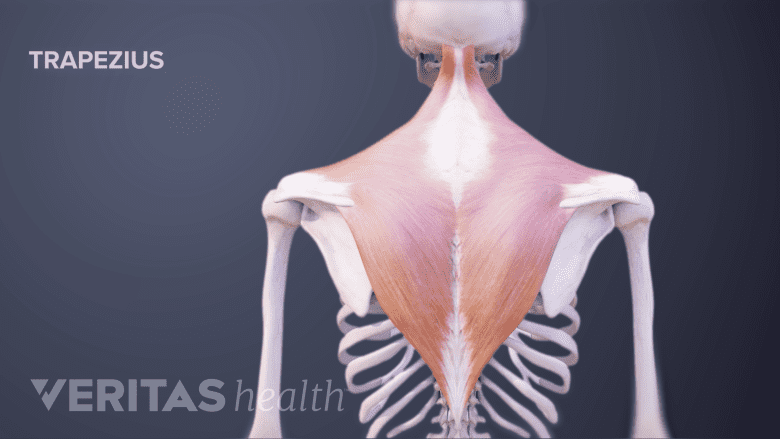Tension headache, also called tension-type headache, commonly causes mild to moderate constricting or tightening pain in the forehead and temple area, with tenderness in the scalp and neck muscles. Tension headache is caused due to muscle contractions in the face, scalp, and neck as a response to stress, strain, fatigue, or other factors.
In This Article:
How Neck Pain May Feel With Tension Headache

Tension headaches can result in neck stiffness and sensitivity in the trapezius muscle.
Neck pain that may accompany a tension headache typically feels achy, tender, and/or tight. In cases where neck pain started before the tension headache, such as from trauma or a chronic neck condition, the neck pain may feel more intense, such as sharp or burning. Sensitivity of the trapezius muscle in the upper neck is common in tension headache, along with stiffness of the neck and scalp muscles.
Types of Tension-Type Headache
There are 3 types of tension headaches depending on frequency 1Chowdhury, D. Tension type headache. Annals of Indian Academy of Neurology (2012), 15(5), 83.:
- Infrequent episodic tension headache: Lasts less than 12 days per year
- Frequent episodic tension headache: Lasts more than 12 days and less than 180 days per year
- Chronic tension headache: Lasts more than 180 days per year
While infrequent episodic tension headache is usually self-managed, frequent episodic and chronic tension headache can cause high disability and prompt medical consultation.
Symptoms of Tension-Type Headache

Tension headaches typically cause a tight sensation in the head along with mild pain.
Common symptoms of tension headache include:
- Constricting or pressing feeling around the head such as wearing a tight hat or tight band or carrying a heavy weight on the head is common in tension headache. The pain is mild to moderate in intensity but may be severe in some cases.
- Neck pain and trigger points are usually present in the neck, shoulder, and face muscles that induce pain upon manual pressure.
- Increased sensitivity to light or sound—any one symptom may be present
- Pain does not worsen with routine physical activity in tension headache.
Lower pain threshold and higher sensitivity to pressure and pain is a common characteristic of people with tension headache. This phenomenon causes stress and tension to easily induce neck pain and headache.
Comparison of Tension Headache With Similar Headaches
A few examples of differentiating factors of tension headache from other headaches are:
- Symptoms of tension headache such as neck pain and tenderness in the head and neck regions are also seen in migraine headache or cervicogenic headache. However, the pain in tension headache has a constricting nature and usually does not worsen with physical activity.
- The pain in tension headache is always triggered by stress; unlike food, smell, hormones, or postures known to trigger other headaches.
A condition called mixed tension-migraine is a headache with characteristics of both tension headache and migraine headache. The migraine headache is believed to occur first, causing muscular tension that leads to tension headache.
There are no diagnostic tests to confirm tension headache. Diagnosis is based on physical examination and medical history including type, location, and characteristics of pain. Diagnostic tests are conducted when a possibility of tumor, infection, or nerve disorder is suspected.
Treatment of Tension Headache

NSAIDs alleviate tension headache pain through their anti-inflammatory effect.
Both pharmacological and non-pharmacological treatments are useful in providing relief from tension headache. A few examples of common treatment methods for tension headaches are:
- Pain-relieving medications. Non-Steroidal Anti-Inflammatory Drugs (NSAIDs) such as aspirin, ibuprofen, and naproxen are commonly available over-the-counter (OTC) and provide relief from tension headache pain. Combining two or more drugs such as aspirin and/or acetaminophen with caffeine into one drug for some people may have better efficacy than single drug medications. Prescription drugs such as ketoprofen and higher strength naproxen may be used to treat severe tension headache.
- Preventive medications. Tricyclic antidepressants, antiepileptic drugs, and muscle relaxants may be used to prevent frequent episodic or chronic tension headache.
- Alternate treatments. Therapies such as relaxation, biofeedback, and stress management may be helpful in relieving stress and tension while also providing pain relief. Some studies suggest a combination of anti-depressant medications and stress management therapy have improved outcomes in treating chronic tension headache.2Holroyd KA, O'Donnell FJ, Stensland M, Lipchik GL, Cordingley GE, Carlson BW. Management of Chronic Tension-Type Headache With Tricyclic Antidepressant Medication, Stress Management Therapy, and Their CombinationA Randomized Controlled Trial. JAMA. 2001;285(17):2208–2215.
- Dietary changes. Limiting or avoiding alcohol and caffeine may help reduce the occurrence of tension headaches in some people.
Prescription or OTC medications taken on a continual basis must be monitored by a doctor and dosages must be followed correctly to prevent side effects. Overuse of pain-relief medication can result in medication-overuse headaches in headache-prone people and can also reduce the effectiveness of preventive drugs.
- 1 Chowdhury, D. Tension type headache. Annals of Indian Academy of Neurology (2012), 15(5), 83.
- 2 Holroyd KA, O'Donnell FJ, Stensland M, Lipchik GL, Cordingley GE, Carlson BW. Management of Chronic Tension-Type Headache With Tricyclic Antidepressant Medication, Stress Management Therapy, and Their CombinationA Randomized Controlled Trial. JAMA. 2001;285(17):2208–2215.

